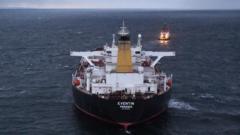German maritime authorities have reported that a tanker associated with Russia's "shadow fleet" became stranded in the Baltic Sea due to mechanical failure. The vessel, named Eventin and registered under a Panamanian flag, is now under the oversight of German rescue operations.
Germany Alleges Russian Tanker Incident Tied to 'Shadow Fleet' Operation

Germany Alleges Russian Tanker Incident Tied to 'Shadow Fleet' Operation
Germany's maritime authorities confirm a distressing encounter with a Russian-linked oil tanker in the Baltic Sea, raising alarm over Moscow's circumvention of sanctions.
On Friday, Germany's maritime coordination center (CCME) disclosed that the tanker lost power and steering capabilities, prompting the deployment of tugboats to secure it. German Foreign Minister Annalena Baerbock attributed the matter to the Kremlin, asserting that President Vladimir Putin is evading international sanctions and jeopardizing European security with his "rusty tankers."
Despite multiple accusations regarding the use of shadow fleets to escape restrictions, Russia has yet to provide commentary on the matter. This situation unfolds against a backdrop of stringent sanctions imposed by the US, UK, and EU in response to Russia's invasion of Ukraine.
Initially reported drifting in the coastal waters north of the German island of Rügen, the Eventin measures a substantial 274 meters in length and carries around 99,000 tonnes of oil. A specialized team was dispatched to the scene via helicopter to establish a towing connection, which was accomplished with three tugboats taking charge of the stranded vessel.
As of late Friday, there were no indications of oil leaks, with authorities monitoring the situation closely. The tow convoy navigated slowly towards Sassnitz, a port town on Rügen Island, hindered by rough sea conditions, such as 2.5-meter waves.
Germany's foreign minister emphasized the dangers posed by Russia's actions, attributing the threats not only to military aggression in Ukraine but also to various disruptive activities such as severed undersea cables and GPS jamming tactics. In December, EU officials indicated they aim to target Russia's maritime tactics further with additional sanctions, particularly against vessels linked to the shadow fleet, which poses environmental and security risks.
The shadow fleet comprises aging ships that lack proper insurance and operate outside established maritime laws, according to assessments from organizations like the Atlantic Council. This incident further illustrates ongoing challenges as the US and UK intensify sanctions on Russian energy companies to undermine Moscow's military funding and operation capacities.
Russia's Gazprom Neft has dismissed these sanctions as unfounded, reiterating their commitment to their operations in the face of Western opposition. Meanwhile, the US Treasury's recent sanctions targeting 183 vessels linked to the shadow fleet reflect a growing international consensus on the need to curtail Russia's oil export capabilities.
Despite multiple accusations regarding the use of shadow fleets to escape restrictions, Russia has yet to provide commentary on the matter. This situation unfolds against a backdrop of stringent sanctions imposed by the US, UK, and EU in response to Russia's invasion of Ukraine.
Initially reported drifting in the coastal waters north of the German island of Rügen, the Eventin measures a substantial 274 meters in length and carries around 99,000 tonnes of oil. A specialized team was dispatched to the scene via helicopter to establish a towing connection, which was accomplished with three tugboats taking charge of the stranded vessel.
As of late Friday, there were no indications of oil leaks, with authorities monitoring the situation closely. The tow convoy navigated slowly towards Sassnitz, a port town on Rügen Island, hindered by rough sea conditions, such as 2.5-meter waves.
Germany's foreign minister emphasized the dangers posed by Russia's actions, attributing the threats not only to military aggression in Ukraine but also to various disruptive activities such as severed undersea cables and GPS jamming tactics. In December, EU officials indicated they aim to target Russia's maritime tactics further with additional sanctions, particularly against vessels linked to the shadow fleet, which poses environmental and security risks.
The shadow fleet comprises aging ships that lack proper insurance and operate outside established maritime laws, according to assessments from organizations like the Atlantic Council. This incident further illustrates ongoing challenges as the US and UK intensify sanctions on Russian energy companies to undermine Moscow's military funding and operation capacities.
Russia's Gazprom Neft has dismissed these sanctions as unfounded, reiterating their commitment to their operations in the face of Western opposition. Meanwhile, the US Treasury's recent sanctions targeting 183 vessels linked to the shadow fleet reflect a growing international consensus on the need to curtail Russia's oil export capabilities.





















